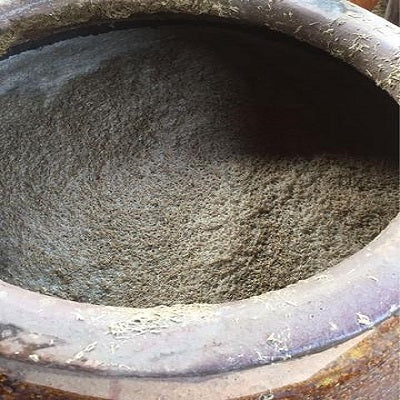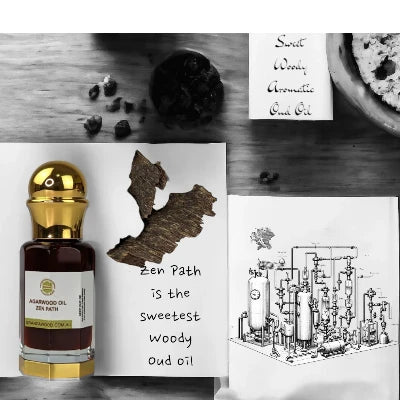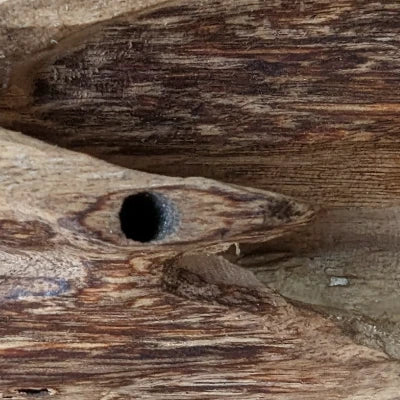Menu
-
-
F.A.Q
- How to identify genuine agarwood chip, natural or cultivated
- How to identify oil injection / absorption fake agarwood beads
- How to know if there are more than one oil in your oil
- How to make your wood bracelet or mala darker
- How to tell if an Agarwood bead sinks WITHOUT sinking it under water?
- How does back flow incense work and how do you burn it?
- Where to start if you don't know what agarwood is ?
- Why are you losing money if you buy seeds and plants?
- Which agarwood incense should I choose?
- Frequently Asked Questions
- Agarwood Related Articles
- Shipping
-
SHOP - Agarwood
-
SHOP - Other Fragrant Wood
-
SHOP - Incense Holder and Burner
-
- FREE guide book
- Testimonials
- "Why did you buy this?"
- Contact us
- About Us
- +61430284329
- Login
-
English


Why does some "bad odour" smells so good in Oud (agarwood) Oil?
January 12, 2020 9 min read
Have you wondered why some oud smell so appalling but some people love it?
Not sure about you but I have. So, today, let's talk about something that stinks.
Food that thousands love, ten hundred hate
Durian
When I was 6, in the morning my Dad bought several durians home before going to work. After school, I was hungry and the thought of eating durian made me drool I was so keen to eat it. I remembered vividly that I even tried to cut the durian myself because my parents were at not yet home. I was impatient, I was drooling. Although it was a difficult task for a kid (as durian's spike was sharp), I cut it regardless.

I could not speak to others, but from my childhood memory, everyone who I knew loved this fruit.
My perception changed when I came to New Zealand and Australia.
In 2003, at my school in Queen Street, Auckland, lunchtime, I had my lunch, and the fire alarm went off "Emergency, evacuate now". All students moved out to an assembled point outside the school.
In less than 10 minutes, two red Fire Truck was outside the school, and a team of Fire Brigade came in.
Later, we were told that a student was defrosting a frozen box of durian in the microwave. She used the heating function instead of "defrosting" for 15 minutes.
The Fire Brigade issued a $1200 to the school. And the principal was kind enough to only issue a warning to the student without on-charging him. We all learnt a lesson.
Sixteen years later, a similar incident happened in Uni of Canberra library prompts evacuation of 550 people(read more, The Canberra Times).\
Durian is just one of the smelliest food in the world. There are many others which I will only provide a brief per below:
- Kimchi: a well-known daily dish of Korean made by fermenting cabbage or radish. Usually, it is stored in a container in the fridge, and if the container cap is not tight enough, your fridge will smell, and it can take weeks to get rid of this smell. What about the taste, you ask? For me, it tastes sour and spicy vegetable. I liked it, and I love the scent. I met many Korean friends, all of them who I met love Kimchi. So one day, I packed a small box of Kimchi for my lunch, my colleagues asked what I was eating because it was so "overpowering", I ask him if he wanted a small piece to try. He knew it was smelly, but he tried regardless. He only nodded his head when I asked, so I guessed his brain is analysing it.
- Mắm: fermented raw fish or prawns, or even crabs, the smell can be offensive to someone who has never smelled it before; It tasted salty and very "aromatic". When I was a kid, I could finish three bowls of rice with this dish.
- Bleu Cheese: When I first encountered this cheese, I saw blue mould dissipated on the whole cheese. When I learnt it is safe to eat, I put a piece in my mouth, and it was quite good. At first, I did not like the aroma, but after a few tries, it was not bad at all.
The above are food examples. Let's look at something that is not human food that has the decomposing smell, yet people line up to sniff it.
The corpse flower (Titan Arum)
What it smells like
- "a distinct stench."
- "smells like rotten seafood."
- "fishy smell like dead shrimp."
- "familiar a little bit of food that may have been rotten in the refrigerator."
However, this particular species of flower is rare, and it emits its odour irregularly (7 years to decades), so when it blooms, many people want to pay a visit. "2014 blooming at the Denver Botanic Gardens was watched from all around the world due to a live feed posted on the garden's website. In August 2016, some 20,000 people lined up to see a blooming corpse flower at the Chicago Botanic Garden." (Bradford 2017)
When learning about this flower, I recalled the experiences in Rotarua, the Sulphur City, in New Zealand. The distinctive sulphur, rotten egg smell does not push people away but attract even more tourists to come. Many of them also return the second and third time.
Again, was the sulphur, rotten egg smell pleasant? Of course not, it was pungent, but why people come to visit?
Don't know what I was talking about? No problem. Let me tell you a different story.
When I was in university, at the end of the semester, there was a fridge clean up day. Students clean out whatever left in the fridge before going on a 2-month break. I witnessed many conversations when a student discovered some "interesting" lunch boxes.
- "Hey Peter, come smell this. It is disgusting!".
- "John, and Trent, look at this rice, it has seven colours: red, black, purple, orange, brown, blue and white, comes here quick".
Comment: the 7-colour rice mentioned above was different types of mould grown inside that rice. It was so bad that I could not even see the rice but the rainbow texture. Peter was the one who called my friend John and I. The image is currently still in my head vividly. I could not un-see it, but somehow I found it is interesting although it looked disgusting. So some of us enjoyed the "disgusting" scene and "appalling" smell. Why was that? Here is the explanation
Benign Masochism
"Benign masochism refers to enjoying initially negative experiences that the body (brain) falsely interprets as threatening. This realisation that the body has been fooled, and that there is no real danger, leads to pleasure derived from 'mind over body.'" (Rozin 2013)
Let's revert to the corpse flower. It stinks, but many people would line up to experience it because
- It is rare. It can take up to 7 years to bloom, and its flower only opens for 48 hours (Eden Project)
- The most important of all, you know it is safe to smell it.
It smells like "rotting flesh", "a flash of diaper", "decaying corpse".
You and I both know, we can enjoy these "smell" at our own home. Just leave the raw meat out of the fridge for three days, and you will experience these smells. There is no need to book a flight to visit these corpse flower and wait until it blooms. My question is: "Would you still visit the venue, and line up for the experience if it is a dead animal to smell it?"
Probably not because our brain knows it is not safe to do so. What do we do when there is a dead rat in our house? Or a dead bird in our garden?. We remove it because it is a health hazard; it is not safe to leave them lying around.
So why I am telling you these?
Because it explained why people like "bad odour" and what seems to be "bad" for you might actually not bad at all. Let's find what makes Oud smell "off "?
What is the cause of "bad odour" of Oud from?
Before we dive deeper, let's take a look at how is agarwood oil made. Please note these are necessary steps only, each oud distiller may have different procedures.
Oud Oil (agarwood oil) distillation process
1) Pulverised agarwood chips into powder
Cut down the Aquilaria trees.

Clean out the whitewood

Grind the chips

2) Store these ground agarwood into clay pots and add water.

This is one of the most critical steps. Experienced oud distiller will know.
- How much water to add. Too little water will result in lower or no yield. Too much water may take a longer time to distil and the quality of the oil.
- How long to soak. Water will soften and corrode the cell of the wood. Over some time, the "contents" of the wood (resin, oil gland) surface and start to release. When this process happens, it is time to begin the next step. Here is the key, if the distiller keeps on soaking, the "juicy stuff" of the wood will release to the water, its chemical properties may change resulting in a lower yield and less aromatic.
Jok, Radzi, and Hamid (2015) indicated that the ideal time of soaking is around 14 days for maximum yield. Please note, consumers (agarwood lovers) are not really interested in the yield but its scent profile. Some would like super heavy the most manure scent they can get which 14 days are insufficient to create.

Here is another interesting part. I have seen some works from someone in this agarwood oil industry. When you soak wood underwater, over time, it will have some microorganism, that is ok. What is NOT ok are mosquitoes and flies.
They love stagnant water and will lay eggs inside these clay pots. As a result, maggot and larvae will develop inside these pots.
Believe it or not, birds frequently patrol too and if there was no cover on the pots, could you guess what would happen?
Oud oil, if distilled from these "unhygienic" material will also have "manure" "barnyard" smell.
3) Transfer the water-pulverised wood from the clay pot to the distillation unit and heat the solution.

Source: Tongnuanchan, P. and Benjakul, S. (2014), Essential Oils: Extraction, Bioactivities, and Their Uses for Food Preservation. Journal of Food Science,
Distillers will slow cook the material between 30 to 60 days

4)The oud essential oil is then cured for several weeks so that the remaining water vaporises
This process could be done inhouse or under the sun. It all depends on the oud distillers.
Ouds that have "bad odour"?
When people use this term to describe what Oud smells like, usually they refer to "manure", "sewerage" or "decomposing note". Many people love this smell because of the positive experience associated with it, or they get used to it.
We have a Middle East client, after trying several Oud, he liked the Middle Easterner and told us how Oud should smell. When we asked them the reasons for saying so, he answered smoothly: "because this was what I smelled when I was young".
Another example, this customer gave us feedback after trying the sample kit. The Agarwood oil which he referred to, was the Floral Superior. To him, it smelled like "animal urine", and it had "wonderful" smell.
The very same Floral Superior, we had completely opposite feedback, although it was the exact same Oud. We know what you are thinking: "but Trent, essential oil will be slightly different every batch" and we agreed, but it should not be a huge difference. Let us show you the review
"Woody and smokey, Oud Floral was the winner of the day; it was fun, unusual, interesting and had the best longevity. It was a hit, and I think you'll be getting orders from the guys who were also extremely pleasantly surprised by your prices."
Both enjoyed the product from a very different perspective. So, in short, it was about personal experiences.
"Why do we like some odours and not others? Are we born hardwired to like or dislike certain smells, or do we acquire these preferences? I argue that our odour preferences are learned, that we are not born prepared to like or dislike any scent. I like the smell of skunk because the first time I smelled it, on a lovely summer's day, my mother said: "Isn't that smell nice?" Ever since then, it has indeed smelled nice to me.
...And Why "bad odour" Oud oils smell so good
Engelhaupt (2015), from National Geographic, explained in details why People Sometimes Like Stinky Things. From her point of view, it was the "indole" that makes the difference.
Indole is also presented in agarwood oil, see compound number 6th below.
Source: Indian J Microbiol. 2018 Jun; 58(2): 201–207.
The compound could change fecal odour to floral scent.
Skatole 3-methylindole
At low concentration, people will smell the floral aroma such as jasmine and orange blossoms. At high concentration, it smells like manure, decomposing, decay death body (ACS 2012).
One of the secrets is the soaking time. When soaking, the indole compound will develop by the decomposition of tryptophan in Aquilaria trees.
If agarwood distiller soaks their pulverised wood for too long,
water will damage the wood, causing the smell will be fecal even before distilling. I have seen some distillers dipped their wood for more than three months. Again, I might be wrong but personally, I thought the wood and its content is damaged heavily, it starts decomposing, and it is "fatal", not just "fecal".
If agarwood distiller soaks their pulverised wood for too short,
there may NOT be any oil at all, and I have seen it. The yield is non-existent.
Skill distiller knows this secret to meet the demands.
If someone like the leathery, animalic, decomposing note: more prolonged soaking with the right temperature will make a higher concentration of the Skatole compounds, making the flavour of "barnyard". "animalic". "decomposing note" inside the oil.
If someone loves ouddy woody and a hint of floral, a shorter soaking time with the right temperature will help the distiller to achieve this result.
So really there is no bad odour at all, it depends on what you like as long as it is safe to enjoy
So if you wanted to move out of your comfort zone and would like to have some Benign Masochism effect, you can try our three of our oud oils.
The process of obtaining these oils are carefully monitored. There are no maggots, flies, mosquitoes, insect eggs or larvae going inside our clay pots which keep our oils free of "extra protein" you don't need.
We have systems and procedures in place to ensure these oils are safe to apply topically on your skin (small batch test is strongly recommended to see if there is any adverse reaction, do not ingest). So if you want to try out these lovely "smelly" oil, find the link below.
Leave a comment
Comments will be approved before showing up.
Also in News

Anoint with The Zen Path, and you will never yearn for the artificiality that numbs the senses
March 03, 2024 2 min read

You say: “Your Agarwood is too expensive”. Let’s Reason Together - about Price
February 14, 2024 8 min read






